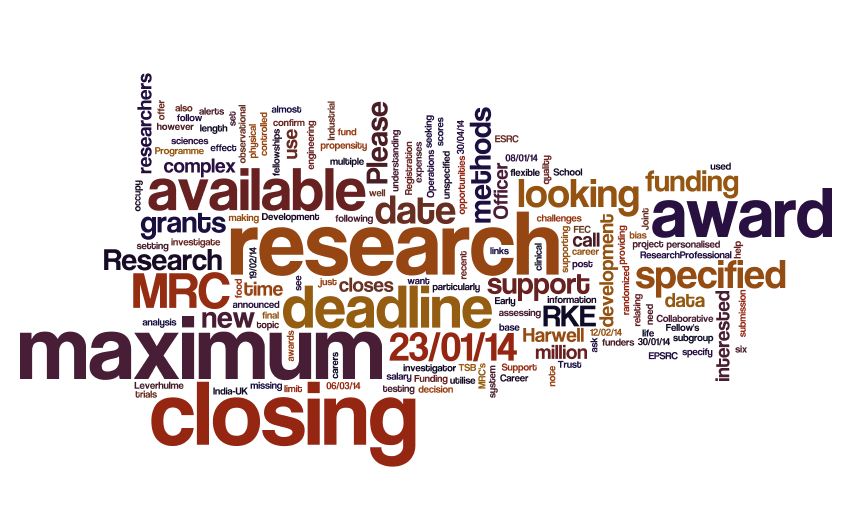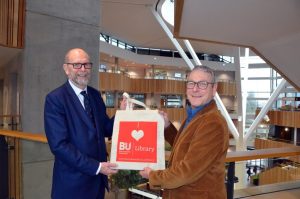A smorgasbord of content for you this week – rifle through to find the topics most of interest to you. We’ve got: pollinators, research integrity, mental health, nursing news, plastic waste, several new funded competitions from the Government, praise for the arts and creative sectors, smart energy systems, immersive technologies, the Industrial Strategy’s Grand Challenges, tackling social challenges, Guidance from Innovate UK and on Horizon 2020, an important survey on international students, new Royal Society Fellows, an article on the AI brain drain, and the forthcoming Environmental Principles and Governance Bill. Enjoy!
Pollinators
On Tuesday Ben Bradley (Conservative, Mansfield) made his case for a Private Members’ Bill to make provision about the protection of pollinators. Permission to progress the Bill was granted and our regional MP Oliver Letwin will take part in presenting the bill.
Research Integrity
Sam Gyimah was interviewed for the Commons Science and Technology Select Committee investigation into research integrity. The committee heard that universities should be held responsible for the full compliance of upholding standards of research integrity but the Minister for Universities, Science, Research and Innovation declined to assert that funding should be dependent on this. Other topics covered included concordant sign up, self-assessment and disclosure in clinical trials. Read the full summary of the session provided by Dods Consultants here.
Mental Health
The Commons Education, Health and Social Care Committees have published their response to the inquiry on young people’s mental health: The Government’s Green Paper on mental health: failing a generation. An oral parliamentary question was also asked on the topic on Tuesday:
Q – Helen Whately: I welcome the Green Paper on mental health in schools, which was published earlier this year, but it does prompt a question about the mental health of students in further and higher education. Does my right hon. Friend have any plans to look into that issue? If he does not, may I urge him to do so?
A – Jackie Doyle-Price: I thank my hon. Friend for her question and her continued industry on these matters. As she mentioned, the Green Paper outlined plans to set up a new national strategic partnership focused on improving the mental health of 16 to 25-year-olds. That partnership is likely to support and build on sector-led initiatives in higher education, such as Universities UK’s #stepchange project, whose launch I attended in September. The strategy calls on higher education leaders to adopt mental health as a strategic priority, to take a whole-university approach to mental health and to embed it across policies, courses and practices.
Nursing Places
Nursing has been in the news again this week. A series of oral parliamentary questions reveal the Government’s unwavering approach towards nurse training and on Wednesday there was a debate on the Government’s plans to remove funding from post-graduate converters into nursing (announced in February). The removal affects the two-year course for those who hold degrees in other subjects. It is controversial as this is the fastest way to train a registered nurse and there is currently a shortage of 40,000 nurses in England. The change brings the post-graduate courses in line with the undergraduate nurse training which has already lost the NUS bursary and now falls under the student loan system.
The Commons debate was secured as a result of opposition pressure, following a report by the Lords Secondary Legislation Scrutiny Committee, which referenced evidence submitted by the Royal College of Nursing (RCN). The RCN arranged for a number of student nurses, who currently receive post-graduate funding, to visit parliament during April to meet MPs and peers and explain what financial support has meant for them.
Michael Lawton, who received the NHS post-graduate bursary and is currently working as a registered nurse, said: “Without the bursary I couldn’t have applied and I wouldn’t be in a career I love, giving patients the great care they deserve. I know I make a difference every day.
MPs I’ve spoken to are shocked at how many hours we do in clinical placement. By removing the bursary, the Government is asking people to pay to work on placements to keep the NHS afloat and that isn’t right.
Current post-graduate nursing student Georgie Ellmore-Jones said:
“After my undergraduate degree I was already in a lot of debt. When I looked at pursuing a career in nursing and saw it was funded, it made it more certain in my mind that I wanted to do it. At post-graduate level many of the students have families and children to look after so adding more debt will only discourage potential students.”
On Tuesday there were a series of oral questions on nursing to the Minister for Health (Stephen Barclay), his answers reveal the Government’s thinking towards nurse training.
Q – Gill Furniss (Sheffield, Brightside and Hillsborough) & (Lab) Stella Creasy (Walthamstow) (Lab/Co-op) & Stella Creasy (Walthamstow) (Lab/Co-op): What assessment he has made of the effect of the withdrawal of NHS bursaries on applications for nursing degrees.
A – The Minister for Health (Stephen Barclay): Nursing remains a strong career choice, with more than 22,500 students placed during the 2017 UCAS application cycle. Demand for nursing places continues to outstrip the available training places.
Q – Gill Furniss: Figures from the Royal College of Nursing show that applications have fallen by 33% since the withdrawal of bursaries. At the same time, the Government’s Brexit shambles has led to a drastic decline in EU nursing applications. How many years of such decline do we have to see before the Secretary of State and the Minister will intervene?
A – Stephen Barclay: What matters is not the number of rejected applicants, but the increase in places—the number of people actually training to be a nurse. The reality is that 5,000 more nurses will be training each year up to 2020 as a result of the changes.
Q – Stella Creasy: The NHS already has 34,000 nursing vacancies. Given that there has been a 97% drop in nursing applications from the EU and that studies show that nearly half of all hospital shifts include agency nurses, will the Minister at least admit that cutting the bursary scheme has been a false economy for our NHS?
A – Stephen Barclay: It is not a false economy to increase the supply of nurses, which is what the changes have done. Indeed, they form part of a wider package of measures, including “Agenda for Change”, pay rises and the return to practice scheme, which has seen 4,355 starters returning to the profession. More and more nurses are being trained, which is why we now have over 13,000 more nurses than in 2010.
Q – Grahame Morris: I respectfully remind the Minister that this is about recruitment and retention. The RCN says that we can train a postgraduate nurse within 18 months, which is a significant untapped resource, so why are the Government planning to withdraw support from postgraduate nurses training, too?
A – Stephen Barclay: We have a debate involving postgraduate nursing tomorrow, but the intention is to increase the number of such nurses by removing the current cap, which means that many who want to apply for postgraduate courses cannot find the clinical places to do so. That is the nature of tomorrow’s debate, and I look forward to seeing the hon. Gentleman in the Chamber.
Q – Robert Halfon (Harlow) (Con): Will my hon. Friend, on top of the degree nursing apprenticeships, rapidly increase the nursing apprenticeship programme so nurses can earn while they learn, have no debt and get a skill that they and our country need?
A – Stephen Barclay: My right hon. Friend is absolutely right to signpost this as one of a suite of ways to increase the number of nurses in the profession. As he alludes to, there will be 5,000 nursing apprenticeships this year, and we are expanding the programme, with 7,500 starting next year.
Q – Stephen Lloyd (Eastbourne) (LD): With every reputable independent body showing very clearly that we have a staffing crisis in the NHS nursing profession, can the Minister explain how cutting bursaries actually improves the situation?
A – Stephen Barclay: I am very happy to do so. We are removing the cap on the number of places covered by the bursaries and increasing the number of student places by 25%, which means that there will be 5,000 more nurses in training as a result of these changes.
Q – Dr Philippa Whitford (Central Ayrshire) (SNP): The Secretary of State’s removal of the nursing bursary and introduction of tuition fees have resulted in a 33% drop in applications in England. In Scotland, we have kept the bursary, a carer’s allowance and free tuition, which means that student nurses are up to £18,000 a year better off, and indeed they also earn more once they graduate. Does the Minister recognise that that is why applications in Scotland have remained stable while in England they have dropped by a third?
A- Stephen Barclay: The hon. Lady speaks with great authority on health matters, but, again, she misses the distinction between the number of applicants and the number of nurses in training. It is about how many places are available, and we are increasing by 25% the number of nurses in training. That is what will address the supply and address some of the vacancies in the profession.
Q – Dr Whitford: Workforce is a challenge for all four national health services across the UK, but, according to NHS Improvement, there are 36,000 nursing vacancies in England, more than twice the rate in Scotland. The Minister claims that more nurse students are training, but in fact there were 700 fewer in training in England last year, compared with an 8% increase in Scotland. The key difference is that in Scotland we are supporting the finances of student nurses, so will the Government accept that removing the nursing bursary was a mistake and reintroduce it?
A – Stephen Barclay: The distinction the hon. Lady fails to make is that in England we are increasing the number of nurses in training by 25%; we are ensuring that nurses who have left the profession can return through the return-to-work programme; and we are introducing significant additional pay through “Agenda for Change”. As my right hon. Friend the Member for Harlow (Robert Halfon) said, we are also creating new routes so that those who come into the NHS through other routes, such as by joining as a healthcare assistant, are not trapped in those roles but are able to progress, because the Conservative party backs people who want to progress in their careers. Healthcare assistants who want to progress into nursing should have that opportunity.
Q – Justin Madders (Ellesmere Port and Neston) (Lab): When defending the decision to scrap bursaries, the Secretary of State said that, if done right, it could provide up to 20,000 extra nursing posts by 2020. Well, that figure now looks wildly optimistic, with applications down two years in a row. Is it not time that Ministers admitted they have got this one wrong and joined the Opposition in the Lobby tomorrow to vote against any further extensions to this failed policy?
A – Stephen Barclay: If Members vote against the policy tomorrow, the reality is that they will be voting for a cap on the number of postgraduate nurses going into the system, and therefore they will be saying that more people should be rejected—more people should lose the opportunity to become nurses—because they want to have a cap that restricts the supply of teaching places.
Plastics
The Government have announced a new research and innovation hub to tackle plastic waste in the oceans.
Arts Projects Support for the North
The PM spoke on Tuesday to praise Britain’s arts sector:
But of course, the value of culture and creativity lies not only in its economic strength. Just as important is the less tangible contribution that it makes to our national life. The work you do brings joy to millions. It fosters unity, gives us a common currency. It helps to define and build our sense of national character.
“Without culture […] society is but a jungle”. Your work is a vital part of our national life and our national economy, and I am absolutely committed to supporting it.
Our ambitious sector deal for the creative industries, announced just before Easter, will see a further £150 million invested by government and industry, spreading success and making the sector fit to face the future.
She also announced a £3 million fund of new money to support creative projects within the Northern Powerhouse region on Tuesday. Offering a mix of grants and loans, the social investment fund will be open to non-profit, community-based organisations that deliver a positive social impact.
Full speech here.
Smart Energy Systems
The Government announced £41.5 million funds for design and trial of of new business models that intelligently link supply, storage and demand in heating, power and transport. Thee Innovate UK competition has two elements: up to £40 million is available for 3 smart energy system demonstrators, while up to £1.5 million is available for studies into new, smarter approaches to local energy.
Audiences of the Future – Commercial opportunities in the creative industries
The Government has announced a funding competition – Audience of the future: demonstrators opening Monday 21 May. £16 million will be invested in 4 large scale creative industries demonstrator projects (£5-£10 million each) through the Industrial Strategy Challenge Fund. It aims to explore future global, mass market, commercial opportunities in the creative industries. Primarily this will be through pre-commercial collaboration at scale. Projects should significantly improve the current state of art in their field. The projects must explore new ways of communication with mass audiences (100,000+) using new immersive technologies and experiences that are a significant advancement on the state of art in the chosen area. The high level of innovation and scale should be capable of transforming the sector and replicable across the creative industries. The project should generate audience and consumer information that could be used to test the viability of new business models. The Government suggests that areas with strong potential could include moving images, access to live sporting events, visitor experiences in museums and galleries, and music and theatre performance. See here for more information.
A further £1 million is available for early-stage projects (£20-60k) that seek to understand customer needs for immersive experiences and the tools needed to deliver them. Early-stage projects should use human-centered design and look at audience behaviour to develop ideas for new products and services. Particular areas could include:
- advancing the state-of-the-art with immersive experiences that are desirable and fit-for-purpose
- producing high-quality immersive content cheaper, faster and in a way that is more accessible
- improving physical devices such as eyewear and controllers, or haptic feedback
- new digital platforms and services to deliver immersive content
See here for more information on the early-stage projects.
Resolving Social Challenges
On Thursday Oliver Dowden (Minister for Implementation) announced a series of competitions for tech firms to develop solutions tackling current social challenges. While the initiatives focus on the business sector some of the topics are interesting. Each contributes to the Government’s Grand Challenges – the data economy; clean growth; reducing plastic waster, tackling loneliness and healthy ageing and the future of mobility – the competition is designed to incentivise Britain’s tech firms to come up with innovative solutions to improve public services.
The forthcoming challenges:
- Identifying terrorist still imagery (Home Office). Home Office research shows that more than two-thirds of terrorist propaganda disseminated online is still imagery. This project will support both Government analysis of, and broader efforts to remove, this harmful material.
- Tracking waste through the waste chain, submitted by Department for Environment, Food and Rural Affairs (DEFRA). A new technological approach could help record, check and track waste, helping boost productivity, reduce costs, and protect both human health and the environment.
- Tackling loneliness and rural isolation, submitted by Monmouthshire Council. The government recognises that rural transport is vital to local communities, and businesses. A technological solution, exploiting vehicles with spare capacity could support rural economies.
- Cutting traffic congestion, submitted by Department for Transport (DfT). Greater collection and new analysis of data could help target interventions to cut congestion.
- Local authorities have large numbers of council vehicles crossing their areas every day. If they can be equipped with innovative data capture systems, they could understand potholes, litter, recycling, parking, air quality and more in real-time, every day, for no added cost. This could mean reduced service delivery costs and better local services.
The first of these competitions opens on Monday 14 May and runs for six weeks, with the remaining competitions being launched in subsequent months. Tech firms bidding to the fund will have free rein to create truly innovative fixes. Winning companies will be awarded up to £50,000 to develop their ideas.
Guidance
Innovate UK have released general guidance for grant applicants, including applying for a business innovation grant, funding rules and participation levels.
The Government have released guidance on Horizon 2020: what it is and how to apply for funding.
International Students
The Migration Advisory Committee (MAC) has been tasked by the Government to assess the impact of international students. Previously they asked for evidence of impact from the HE sector with much response from HE institutions but little response from international students themselves. To redress this evidence gap the MAC have issued a survey directly to students. Universities have been asked to disseminate this survey and encourage their students to complete it. Here is the link.
Environmental Principles and Governance Bill
Michael Gove has announced the introduction of the Environmental Principles and Governance Bill, which will “ensure environmental protections will not be weakened as we leave the EU.” It will introduce a new body to hold the Government to account for environmental outcomes. Subject to consultation, the new body could specifically be responsible for:
- providing independent scrutiny and advice on existing and future government environmental law and policy;
- responding to complaints about government’s delivery of environmental law; and
- holding government to account publicly over its delivery of environmental law and exercising enforcement powers where necessary.The Government is also consulting on an intention to require minister to produce a “statutory and comprehensive policy statement setting out how they will apply core environmental principles as they develop policy and discharge their responsibilities”. The new Bill will also ensure Government’s continue to have to regard environmental principlesRoyal SocietyArtificial Intelligence
- The Financial Times has an article: UK universities alarmed by poaching of top computer science brains.
- Wonkhe report that: 50 new Royal Society Fellows and Foreign Members have been elected to join the existing c.1,600. They are all scientists, engineers, and technologists who are from, or living and working in, the UK and the Commonwealth. New additions include Jim Al-Khalili, Michelle Simmons and Elon Musk, with David Willetts the Honorary Fellow,. Of the 50 12 are women.
- The consultation will run for 12 weeks, closing on Thursday 2 August. The draft will be published in the Autumn, and the Bill will be introduced in the second session of this parliament.
Best wishes,
Sarah







 It’s been over 18 month since Bournemouth University launched its new
It’s been over 18 month since Bournemouth University launched its new  Open access is about making the products of research freely accessible to all. It allows research to be disseminated quickly and widely, the research process to operate more efficiently, and increased use and understanding of research by business, government, charities and the wider public.
Open access is about making the products of research freely accessible to all. It allows research to be disseminated quickly and widely, the research process to operate more efficiently, and increased use and understanding of research by business, government, charities and the wider public.




 The BBSRCs
The BBSRCs  NERC
NERC  EPSRC is holding a two-day
EPSRC is holding a two-day 












 NIHR-funded research launches website
NIHR-funded research launches website Academics write for newspaper in Nepal
Academics write for newspaper in Nepal New paper published on disability in women & girls
New paper published on disability in women & girls Global Consortium for Public Health Research 2025
Global Consortium for Public Health Research 2025 World Drowning Prevention Day at BU
World Drowning Prevention Day at BU MSCA Postdoctoral Fellowships 2025 Call
MSCA Postdoctoral Fellowships 2025 Call ERC Advanced Grant 2025 Webinar
ERC Advanced Grant 2025 Webinar Horizon Europe Work Programme 2025 Published
Horizon Europe Work Programme 2025 Published Horizon Europe 2025 Work Programme pre-Published
Horizon Europe 2025 Work Programme pre-Published Update on UKRO services
Update on UKRO services European research project exploring use of ‘virtual twins’ to better manage metabolic associated fatty liver disease
European research project exploring use of ‘virtual twins’ to better manage metabolic associated fatty liver disease